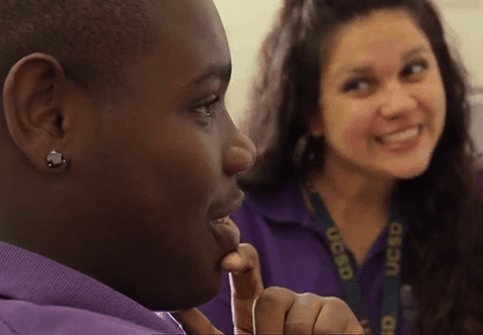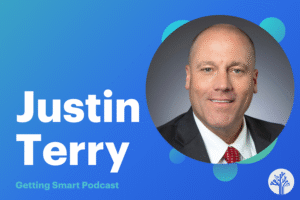Let’s Get Personal: Paths to Meaningful Individualized Learning

When it comes to powerful learning for students, the education community has come up with a variety of models that seek to improve student outcomes. Be it personalized, deeper, blended, project-based, next-gen, or student-centered, the new vision of learning is one that gives high importance to the learner experience. As we think about what’s next, we will continue to see power in the union of more than just one of these models.
Lydia Dobyns, President and CEO of New Tech Network, a Getting Smart Advocacy Partner, shares NTN’s vision for the future of project based learning, one that is highly personalized to ensure that the individual student experience is memorable, engaging, and powerful. This was originally posted on the Huffington Post.
Lydia Dobyns
Personalization in education is a hot topic. Conferences on blended or personalized learning are huge draws. The EdTech space is filled with products and promises. So how does a teacher or parent or district leader separate hype from promising strategies? Let’s start with a basic premise: personalization is not a pedagogy (a theory and method for teaching and learning). Simply adding technology tools to old school models will at best reproduce better ‘old’ outcomes, and we ask is that what we want for students today? Take a look at this great article by Tim Hudson on why less instructional time will solve the math problem we have in this country.
We think the aim of “personalized learning” should be to move students through increasing levels of independence and self-direction while addressing critical knowledge and skills development. To achieve true personalization as an outcome for all students, we believe in a focus on the whole school design and on changing district and state policies that move us away from a “compliance” orientation to one of continuous improvement and growth (for individuals and for schools). While personalization happens for students through classroom-level interactions, our experience is that it takes coordinated school-wide attention to have enduring changes in practices that meaningfully impact student outcomes.
As a national non-profit school development organization our aspiration is huge. We want to help create a nation proud of its education system, where every public school has the capacity to realize the full potential of each student.
We know we can’t achieve what we hope without increasing the capacity of schools to better attend to the individual needs of students. For our work we see this as “getting personal” in ways that are consistent with our beliefs about education and our espoused pedagogy.
We believe the way teaching and learning happens within the classroom can allow for personalized learning to occur in a very different way than is currently being thought of, and practiced. A rigorous, high quality project and problem approach to teaching and learning creates a set of environmental conditions where good teachers can do tremendous personalization work. This approach allows students to enter the learning at their level and make sense in a very personal way.
The conversation around personalization has increasingly come to represent a narrow strategy of computer-based remediation designed to close individual skill gaps at an accelerated pace. Moreover, the practice often happens disconnected from the core educational experience of the students (e.g. as an intervention period or as tailored homework).
Instead of searching for the best add-on or parallel edtech product to address personalization, let’s look for ways to make all classroom instruction more effective at meeting individual student needs. This means supporting teachers to develop quality deeper learning experiences for all students be a top priority. We see Project Based Learning as a powerful context for personalization. Our work with nearly 200 schools around the country includes helping principals and teachers think about the ways in which technology can further enhance that experience. Marrying PBL and personalization can multiply the teacher’s presence, giving students access to the learning tools adults use in the “outside” world to answer our own questions and needs, and produces better data around learning student and teacher reflection and decision making.
This is not yet the norm in every classroom in each of the NTN schools, however it is the desire. We have been “learning our way” to resolve the tension between a collaborative/group-based pedagogy with the need to assess and instruct at the level of the individual student. Since 2011 we have embarked on a series of new instructional practices within the New Tech school model to incorporate literacy tasks, individual assessments of knowledge and thinking and college ready performance tasks. As we articulate what we mean by “personalized learning” we see this as part of the ongoing evolution of our robust school model – not a wholly new undertaking.
Our hope is to re-imagine the “personalization” conversation for our network in a way that is consistent with our beliefs about what quality learning experiences look like, focusing on a more personalized total school experience that reflects the following elements: 1) Students who are empowered to be self-directed in their interests/passions through, 2) the process of inquiry/PBL, while 3) using assessment data to design experiences that 4) intentionally seek to address critical areas of improvement that either impede student learning or are essential for future success.
We are experiencing an exhilarating time in education innovation. For many the pace of change is too slow and for others the “new techniques” being implemented are band-aids applied to an antiquated system. Wouldn’t it be refreshing if we could recognize that we don’t know the answers so much as we agree on the diagnosis of the problems we are trying to solve? We think this is an essential first step to get us on the journey to create a vibrant public education system.
For more, check out:
- Smart Lists: 70+ Top Charter Networks & School Managers
- How to Innovate: Combine New Tools & New Schools
Lydia Dobyns is President & CEO New Tech Network. Follow Lydia on Twitter, @LydiaDobyns.
Stay in-the-know with all things EdTech and innovations in learning by signing up to receive the weekly Smart Update.





0 Comments
Leave a Comment
Your email address will not be published. All fields are required.